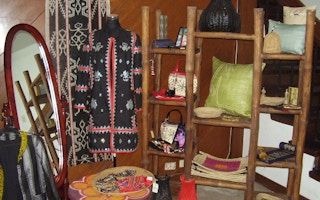Soon, consumers may find Philippine products labeled with a sticker certifying them as “biodiversity-friendly.”
The government is hoping to launch a certification scheme to promote this new green label for products and enterprises in the Philippines.
A Joint Administration Order (JAO) between the Department of Environment and Natural Resources, then Department of Trade and Industry (DTI), and the Department of Tourism (DOT) is now in the works and is set for release within the year, said Joy Reyes Eugenio of the Biodiversity Partnerships Project under the DENR.
The JAO “Adopting Biodiversity-friendly Business and Enterprise Framework and Criteria” hopes to encourage entrepreneurs, indigenous peoples, local government units, people’s organizations, and consumers to promote an economy that values biodiversity conservation and environmental sustainability.
A labeling or certification scheme is essential for this to happen.
“It will distinguish these products above the rest as safe for biodiversity. It’s like you’re putting a premium on the product. There’s already a niche market for eco-friendly products,” Eugenio told Rappler.
A draft of the JAO obtained by Rappler defines “biodiversity-friendly” enterprises as enterprises that “promote the sustainable use of biological resources; create wealth and value; and open opportunities for the equitable sharing of benefits among stakeholders.”
Though “green labels” abound in the local market, the “BD-friendly” label will be the first eco-friendly label to be enforced by the government.
It will be similar to the Organic Certification Center of the Philippines (OCCP), which works with the Department of Agriculture to certify if products are organic. But the “BD-friendly” certification scheme will focus on impacts of businesses on the environment.
“
It will distinguish these products above the rest as safe for biodiversity. It’s like you’re putting a premium on the product. There’s already a niche market for eco-friendly products.
Joy Reyes Eugenio, Biodiversity Partnerships Project, DENR
Like OCCP, there will be a checklist of requirements which enterprises must fulfill before being awarded the certification.
It is likely that these enterprises will have to pay a fee to get certified, says Reyes. The government is also likely to team up with a private sector 3rd party that will evaluate the businesses and issue the certification.
Economic activities have a huge impact on the environment. The DENR says agricultural expansion has become the number one threat to Philippine forests.
This happens when communities living near protected areas grow in population. To make way for new crop fields, the communities tend to cut and burn (kaingin) forests.
By developing a market for products that do not endanger forests, the government hopes to persuade communities that protecting forests is more economically viable than destroying them.
Eco-conscious economy
What does it take to be a “biodiversity-friendly” business?
The draft DAO mentions 3 umbrella criteria:
1. Business operations must protect ecology
- Main or primary raw materials are naturally-grown non-timber (not wood) forest products
- Method of extracting or gathering raw materials does not harm the environment
- Does not require use of strong, harmful chemicals
- Chemicals are properly used and disposed of
- Use of raw materials does not lead to degradation of natural resources
- Promotes efficient use of energy and materials
- By-products are recyclable or enterprise should properly dispose of wastes
2. Economic benefit for community
- Provides opportunities for employment and engagement of the community
- Empowers women and indigenous peoples
- Provides alternative livelihood for forest-dependent communities
- Discourages employment of children
- Provides additional source of income for the LGU
- Promotes working conditions that address health and welfare of workers
3. Equal benefits for all stakeholders
- Women and IPs actively participate from planning to implementation
- Increased employment opportunities for women, men and IPs
- Enhancement of technical knowledge and skills of women, men and IPs
What are BD-friendly businesses?
There are certain types of businesses that may already fall under the definition of “BD-friendly” enterprises. These include:
1. Business that rely on forest or marine resources as raw materials but have practices that replenish biodiversity
Examples of these are community-based or backyard nurseries for indigenous trees or plants, sustainable harvesting of raw materials for pharmaceuticals, or income-generating maintenance of bamboo near rivers that reduce river siltation.
Here, natural resources are used in a sustainable and managed way.
2. Businesses that divert communities from using up forest or marine resources
Examples of these are coconut sugar plantations, integrated organic agriculture or recycling of plastics or other waste into items like mats, bags and furniture.
These are economic activities that turn communities away from pursuing enterprises that will harm biodiversity such as slash-and-burn farming, logging or fishing in over-exploiting fishing grounds.
3. Businesses that generate fees that encourage maintenance and protection of biodiversity
Ecotourism, in which strictly-regulated visitors are allowed inside undisturbed ecosystems, falls under this. The community and enterprise can share in entrance fees or payment of tourists for a night in a homestay.
It also includes payment of IPs for tour-guiding or serving as forest, sea or lake guards.
This category includes payment for ecological services in which a company or establishment (like a resort) pays for the use of natural resources like water or geothermal energy.
4. Businesses that use non-timber forest products or marine resources that are still abundant
Non-timber forest products are products you can get from the forest that does not involve the cutting of trees. These include game animals, nuts, seeds, berries, mushrooms, oils and medicinal plants. These so-called “secondary forest products” can be used to make handicrafts, furniture, medicine and natural dyes.
Are you interested in starting a biodiversity-friendly business? The DENR is holding a forum on Wednesday, February 11, to link up potential investors with forest-dependent communities already making BD-friendly products.
The forum, which will start at 9 am, will be held at the Intercontinental Hotel in Makati City.










